Content
- Introduction
- Why were there more successful companies before?
- So, the main reasons are greed and stupidity? Yes, but no!
- What's next?
- Conclusion
Introduction
Last week I gave a selection of IT companies, investing in the shares of which you could make good money.
 Is it possible to make money on shares of IT giants?
Is it possible to make money on shares of IT giants?
Probably, some readers might have thought that making money on the securities market of hi-tech companies is easy and pleasant. However, this is a misconception. Professor Jay Ritter from the University of Florida has collected interesting statistics reflecting current global trends. It turns out that only 17% of high-tech companies that listed their shares on exchanges made a profit for their owners in 2017.
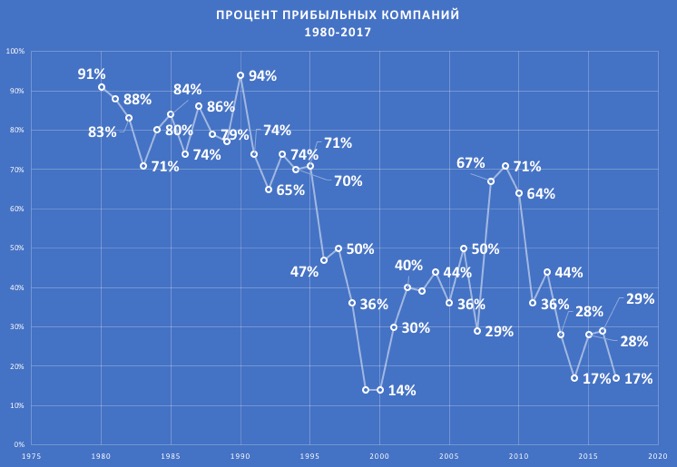
The situation was worse only in the early 2000s, when the so-called dot-com bubble attracted hordes of projectors to the market. Many companies enter the stock exchange that have nothing behind their souls except an idea, and even that can often be ill-considered.
Why were there more successful companies before?
Why was the percentage of commercially successful companies higher before?
There are two versions and they are related.
There is a lot of reasoning that people have become dumber with the Internet – why bother when you can ask Google, trust network experts and succumb to the waves of general hype? However, in my opinion, everything is not so simple here, but the Internet, of course, has brought about changes in the human worldview.
Olga Vasilyeva, who works as the Minister of Education, recently said that a quarter of Russians do not know functional reading.
The term 'functional reading' was introduced by UNESCO in 1957 along with concepts such as minimum literacy and literacy. I will quote a textbook on the development of skills in this type of activity: Functional literacy is a person's ability to use reading and writing skills in the context of his interaction with society (open a bank account, read the instructions, fill out a feedback form, etc.), that is, the level of literacy, which gives a person the opportunity to enter into relations with the external environment and adapt and function in it as quickly as possible. In particular, this includes the ability to freely use reading and writing skills in order to obtain information from the text and in order to convey such information in real communication, communication through texts and other messages.
The simplest example of problems with functional reading is the typical situation when, after reading the sign 'No bread', a person asks: 'Not at all?'. This also includes attempts to open the door without delving into the content of the 'To myself' sticker.

The situation is typical not only for Russia. With the spread of the Internet, the amount of information has increased significantly. First, a person with an endless stream of data is simply difficult to cope with. Concentration is a difficult skill. Try at least half an hour to do something not the most interesting thing (for example, write a note 'What I have achieved in life') and not be distracted by the phone, extraneous thoughts, reading the Internet and social networks.
Secondly, the Internet has increased the speed of access to information, but the bandwidth of the brain has remained the same. It turned out to be a situation when you want it faster, but it doesn't work out, because of this, functional reading performance deteriorates, or, in simple terms, 'you look at a book, you see a fig'.
Such a lyrical digression was necessary to explain the decline of critical filters in humanity. And therefore, more companies with raw ideas are listed on the stock exchange than before.
Their investors, and even the founders, often either do not understand the subject, or dream of getting rich quick. This, incidentally, is another side effect of the Internet, which reached its climax in 2017. The average layman is surrounded by stories about how many millions bloggers earn on YouTube, how many girls on Instagram playfully “raise”, and when bitcoin fired and the yield exceeded tens of thousands of percent, then a massive insanity finally occurred. Banal thirst for profit pushes on rash investments. You want the result here, now, and preferably without complicated thinking. So it turns out burning money.
So, the main reasons are greed and stupidity? Yes, but no!
Pro Amazon
The main idea behind burning money is to attract customers. Companies expect to gain a certain mass of users, which will ultimately bring it to self-sufficiency. Spotify is taking this route now. You can read more about music streaming services losing money here:
 While the music is playing
While the music is playing
However, the best examples of companies that 'did' remain Amazon and AirBnB's rental service.
Amazon was founded in 1994. The company entered the stock exchange in 1997. And she could not earn the first four years, but then it cannot be said that things were going smoothly. Only in 2003 the company was able to add a full profitable year to its asset
Amazon never paid dividends and all the time was in a severe shortage of free money, as she constantly invested heavily in business development. Conventionally, the cheapest and best Kindle e-books, Fire tablets at bargain prices are direct consequences of the investment strategy Amazon.
Investors on the stock exchange did not understand the position well Amazon, so the volatility of the shares, especially at the first stage, was awful. From $ 100 to $ 5? No problem!
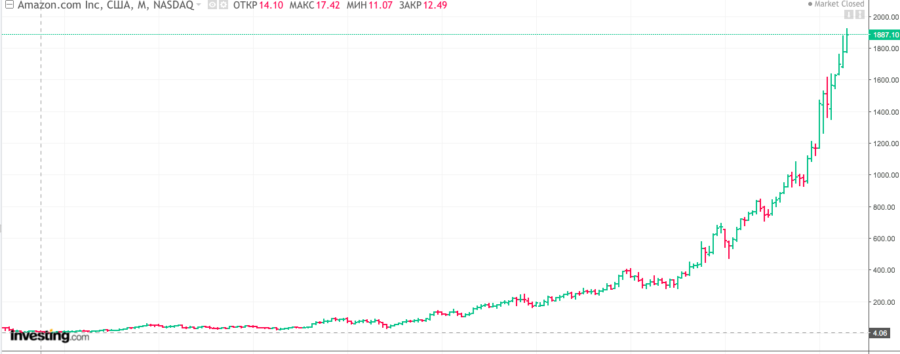
Most believed that it was impossible to make money selling books (Amazon was originally a bookstore). However, gradually the owner of the company Jeff Bazos began to add more and more new options. First came CDs, then videos, then furniture, and after eBay, the company adopted the tactics of selling second-hand goods.
Back in 2012-14, the company burned $ 4 billion, and today its shares are trading at a price of $ 1,900. And it is her example that inspires investors like Uber, Tesla, Spotify and a number of others.
About AirBnB
Another company that has been operating at a loss for 10 years is AirBnB. AirBnB recorded its first profitable year only in January 2018. The profit was small – only $ 100 million, but a start has been made, and the company is considering options for entering the stock exchange.
The main reason why it took so long to gain profit is the constant investment in the development and expansion of its network. If the company had slowed down a little, it could have declared profitability much earlier. And the current profit is important because, despite the continuing non-stop movement forward, AirBnB still had a couple of coins in its wallet at the end of the year.
About MoviePass
However, for one Amazon there are myriads of losers.
At the same time, it is interesting that if investors risk being left with their noses, then for ordinary users these are sometimes attractions of unprecedented generosity. The news spread in the Western media that investors are trying to sue the owner of the MoviePass service as having deceived their hopes and aspirations.
I guess many have not heard of MoviePass, so I will give you a quick reference. MoviePass is a service offering movie passes. The scheme is quite simple. By registering in the application, the client receives a MoviePass co-branded credit card.

Next, he needs to select a session in one of the friendly cinemas and come to it. The maximum distance from the cinema is 100 yards, or 92 meters. After that, the money will be credited to the card, and the client can buy goods at the checkout. It is possible to buy some tickets online, then the user receives a code, which he then must present at the checkout.

With the application, you can go to the cinema once every day at any time and to any movie. Initially, the subscription cost was $ 30, and the application was not very popular. However, after the price dropped to $ 9.95, the subscriber base grew.
In July of this year, the company suffered a technical default, coupled with a loss for the first fiscal quarter of $ 106 million.
It should be clarified that the MoviePass service is listed on the exchange through the parent company Helios & Matheson Analytics Inc. Rumors circulated for a long time, but the monstrous first quarter broke through the shares, and the default with denial of service finally buried the last hopes. Thus, the shares, the price of which, in the wake of the general success of the group of companies, reached $ 8,000 per share, dropped to 5 cents. And something tells me that it's too late for investors to sue.
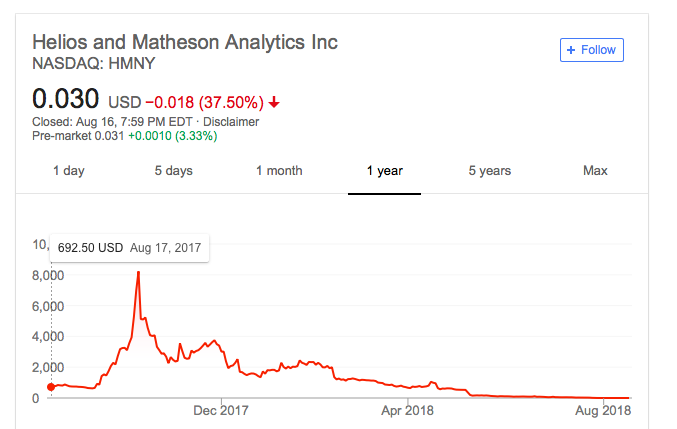
Let's try to briefly understand the reasons for the failure of the project, although, in fact, they are on the surface. The average US movie ticket price is $ 9.16, and the $ 9.95 MoviePass offered to go to the movies once a day for a month. From the consumer's point of view, the deal is not just profitable, but in the format 'give two!' But from the business side, questions arise, since MoviePass did not have any special relationship with cinemas (for example, if a client from MoviePass bought popcorn, the company will receive a percentage), there were no bonuses for the number of clients. In short, apart from selling subscriptions, MoviePass did not make any money. Accordingly, the company could spend from $ 0 per client if he did not have time for cinemas, to $ 275 if he visited the cinema every day. In simple terms, MoviePass was in the business of selling a dollar for 10 cents and it went bust as a result.
Posted by glenn harvey (@glennharveyart)
Illustrator Glen Harvey made this gif for the New York Times.
Surprisingly, the service still continues to exist and is struggling to survive. The company recently received a $ 300 million line of credit.
The rules have changed a bit. The company is now encouraging customers to attend less popular sessions by introducing the concept of peak times. An additional commission may apply to a box office film at a better time. For example, you are asked to pay an extra $ 4 in the example below:

The amendments, of course, are wonderful, but the new rules did not solve the current situation in any way, and it is still not clear what exactly the company plans to make money on.
What's next?
There are more and more companies on the market that come out with dubious ideas and burn out or are close to it. Looking at Amazon, AirBnB, and the same Apple, the company reported a loss of $ 874 million in the worst year, investors believe that everything is fine. Today we lost the ruble, but tomorrow we earned 10. Bloomberg has an interesting material on this topic with an indicative graph:
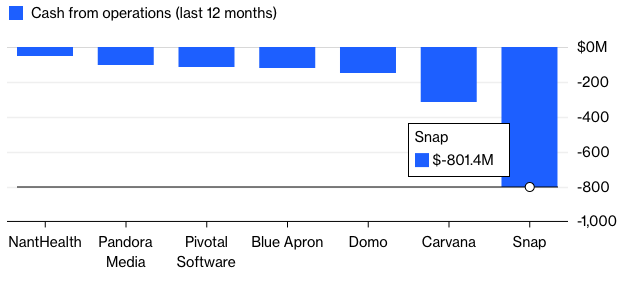
Shown here are data for the most recent fiscal year. The one that stood out the most was Snap, which you know from the Snapchat app. The main feature of the application is the ability to share videos and thoughts without the risk that someone else will see the message. And after a certain time, the messages are self-deleted.

And in this case, Snapchat is strikingly different from MoviePass, although both companies are unprofitable, since Snapchat has a product with the potential to make money. However, in the coming years, you might not expect Snapchat to become profitable. In early spring this year, the company confirmed that it is going to invest 3 billion in the next 5 years in cloud services from Google and Amazon.
Conclusion
The conclusions for this article are very simple:
- Thinking is difficult, many people prefer not to think, but to trust someone else's opinion. Don't do that.
- If a company burns money, this does not mean that everything is bad for it. You have to look at the product.
- The product is important, but you need to figure out the prospects and live up to the moment when the company becomes profitable. You can understand the prospects by examining the available financial statements; on specialized sites, you should also evaluate the volume of attracted investments.
- It is important to look at the target industry as a whole and related industries. For example, when Tesla got started with electric cars, it was unique. Now almost all global automakers are preparing to release their answer, because many countries have already voiced the idea of abandoning the internal combustion engine in the coming years. Below is a list of countries and the years the ban came into force.
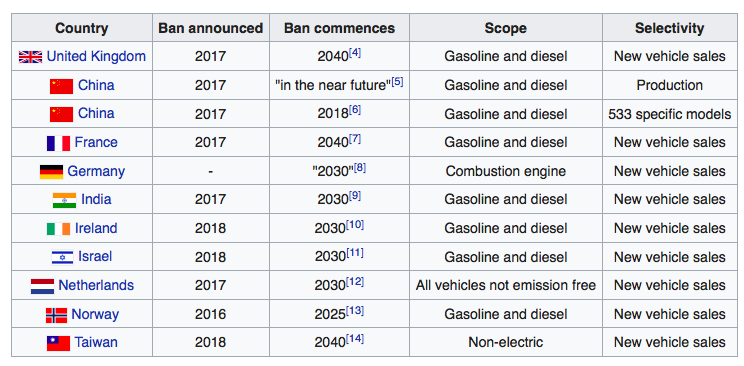
- The stock market is a dangerous thing. Remember that the rule applies here: the higher the risk, the higher the return. However, you can also go bust in low-risk investments.
Back to content >>>
